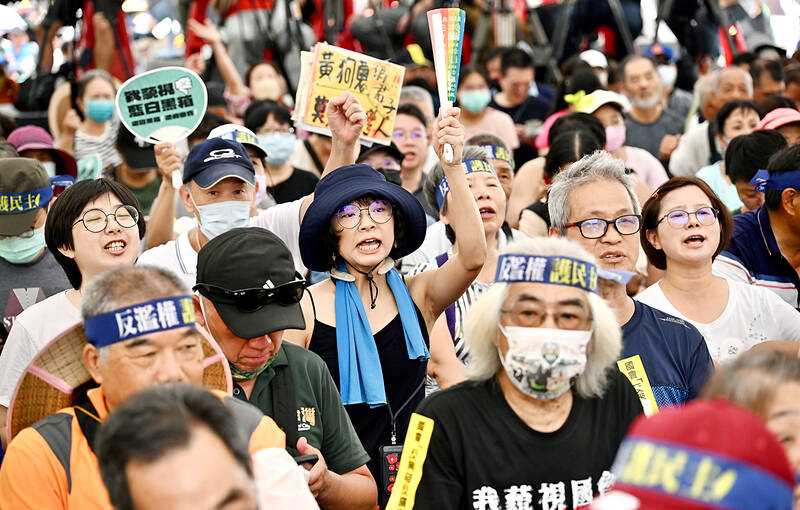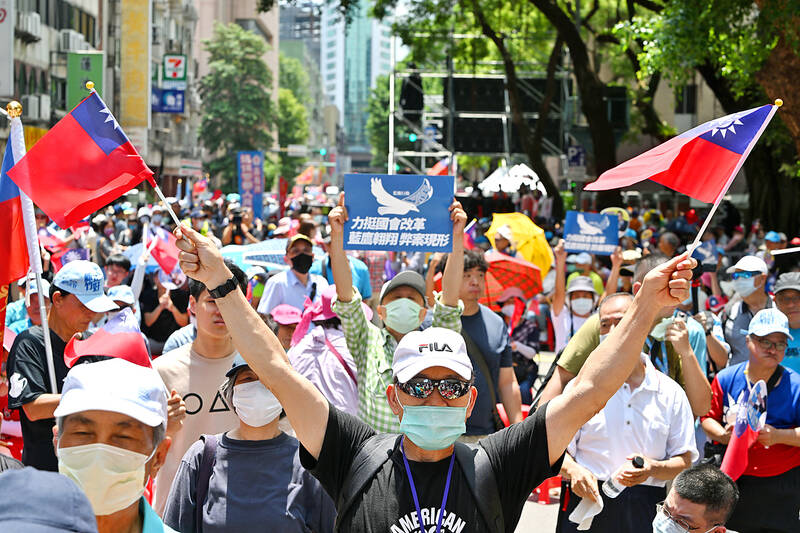Demonstrators outside the Legislative Yuan yesterday finished a three-day protest against reform bill packages proposed by opposition parties. Event organizers said that more than 30,000 people joined the protest last night.
The three-day protests, which are part of the “Bluebird movement” — protest against legislative reform bills proposed by Chinese Nationalist Party (KMT) and Taiwan People’s Party (TPP) lawmakers, who say they are to enhance the power of the legislature — were organized by more than 50 civil society groups.
The event organizers said yesterday that their efforts would continue in the coming weeks.

Photo: Lo Pei-de, Taipei Times
They said they would form six working groups to continue to monitor the legislative process and oppose enacting the bills.
“It is the consolidation of ‘six strong forces’ of civil society groups to scrutinize and track the legislative process,” said Hsu Kuan-tse (許冠澤), deputy secretary of the Economic Democracy Union, which was one of the organizers of the protests.
Hsu said that the working groups would focus on the specific scope of the bills, including the KMT’s attempt to restart the Special Investigation Division, construct three major transportation projects in eastern Taiwan, regain control of China Youth Corps assets, restore the operating license of CTi TV News, raise the threshold for recalls against elected representatives and water down the Anti-Infiltration Act (反滲透法).

Photo: Tien Yu-hua, Taipei Times
“This week’s ‘Bluebird’ gathering has shown the strength of Taiwan’s civil society ... each day has seen thousands of people participating at these outdoor lectures and speeches, who were not deterred by the scorching heat and thunder storms, and showed their courage and determination to protest outside the Legislative Yuan,” Taiwan Citizen Front executive Lo Yi (羅宜) said.
“We are here to condemn KMT and TPP lawmakers who obey the instruction of their party leaders, for which they stand contrary to the public will. They will certainly pay the price,” Lo said.
Other speakers said that a number of constituencies have started recall campaigns against KMT legislators.
The KMT yesterday mobilized its supporters to stage a counter-protest nearby the Bluebird protesters on the other side of the closed section of the road. No violent incidents were reported.
KMT officially named their counterprotest the “Blue Eagle Action.” Participants convened in their thousands and listened to speeches by KMT politicians on stage. They also spoke about initiating recall campaing against DPP legislators.
The two sites were separated by metal barriers, and a large number of police officers were on duty to ensure people kept to their own section and no scuffles broke out.
The “Blue Eagle Action” protesters arrived shortly after 8am, and they departed by midday.

Alain Robert, known as the "French Spider-Man," praised Alex Honnold as exceptionally well-prepared after the US climber completed a free solo ascent of Taipei 101 yesterday. Robert said Honnold's ascent of the 508m-tall skyscraper in just more than one-and-a-half hours without using safety ropes or equipment was a remarkable achievement. "This is my life," he said in an interview conducted in French, adding that he liked the feeling of being "on the edge of danger." The 63-year-old Frenchman climbed Taipei 101 using ropes in December 2004, taking about four hours to reach the top. On a one-to-10 scale of difficulty, Robert said Taipei 101

Taiwanese and US defense groups are collaborating to introduce deployable, semi-autonomous manufacturing systems for drones and components in a boost to the nation’s supply chain resilience. Taiwan’s G-Tech Optroelectronics Corp subsidiary GTOC and the US’ Aerkomm Inc on Friday announced an agreement with fellow US-based Firestorm Lab to adopt the latter’s xCell, a technology featuring 3D printers fitted in 6.1m container units. The systems enable aerial platforms and parts to be produced in high volumes from dispersed nodes capable of rapid redeployment, to minimize the risk of enemy strikes and to meet field requirements, they said. Firestorm chief technology officer Ian Muceus said

MORE FALL: An investigation into one of Xi’s key cronies, part of a broader ‘anti-corruption’ drive, indicates that he might have a deep distrust in the military, an expert said China’s latest military purge underscores systemic risks in its shift from collective leadership to sole rule under Chinese President Xi Jinping (習近平), and could disrupt its chain of command and military capabilities, a national security official said yesterday. If decisionmaking within the Chinese Communist Party has become “irrational” under one-man rule, the Taiwan Strait and the regional situation must be approached with extreme caution, given unforeseen risks, they added. The anonymous official made the remarks as China’s Central Military Commission Vice Chairman Zhang Youxia (張又俠) and Joint Staff Department Chief of Staff Liu Zhenli (劉振立) were reportedly being investigated for suspected “serious

American climber Alex Honnold is to attempt a free climb of Taipei 101 today at 9am, with traffic closures around the skyscraper. To accommodate the climb attempt and filming, the Taipei Department of Transportation said traffic controls would be enforced around the Taipei 101 area. If weather conditions delay the climb, the restrictions would be pushed back to tomorrow. Traffic controls would be in place today from 7am to 11am around the Taipei 101 area, the department said. Songzhi Road would be fully closed in both directions between Songlian Road and Xinyi Road Sec 5, it said, adding that bidirectional traffic controls would